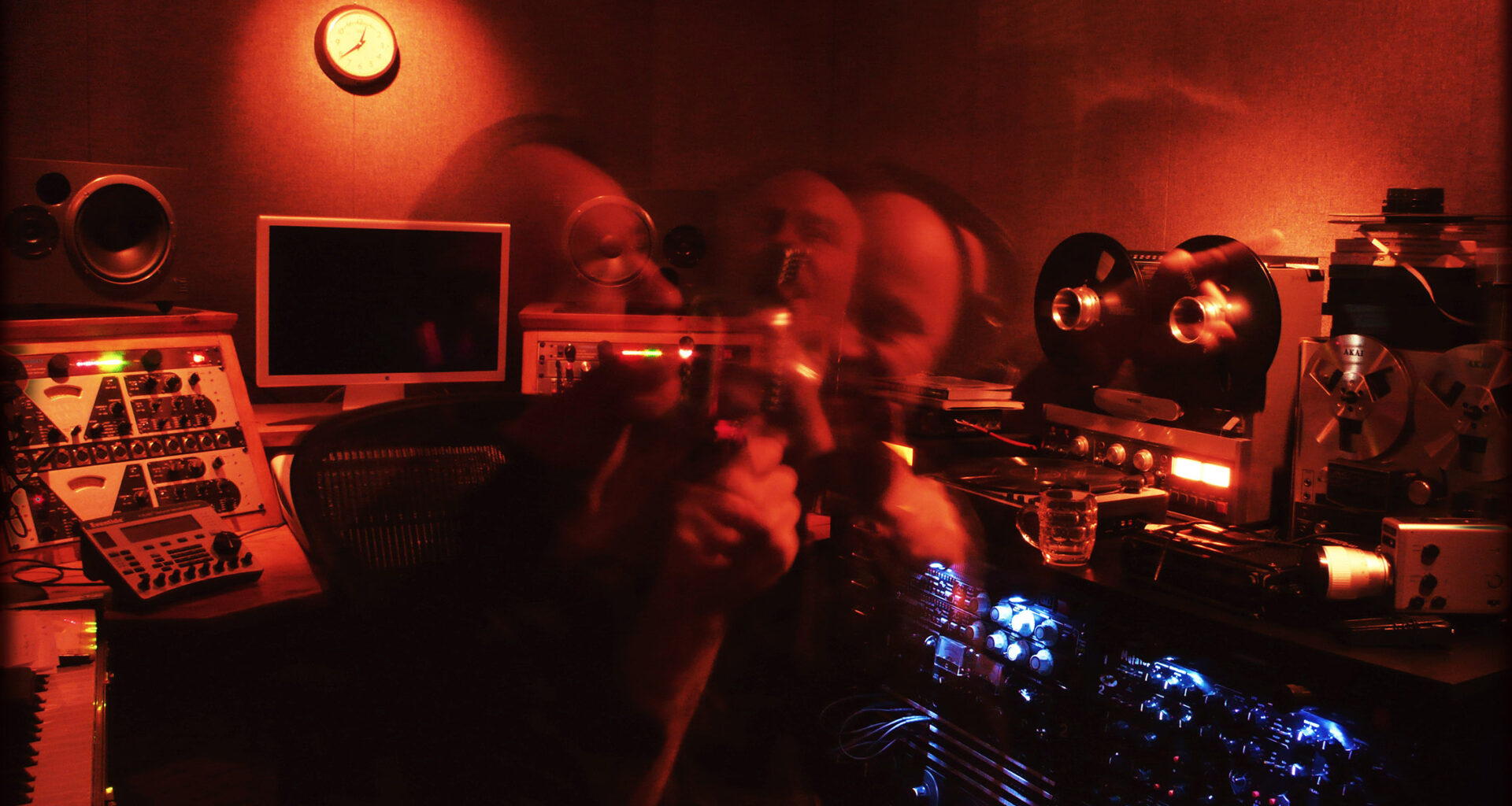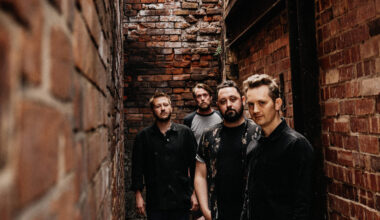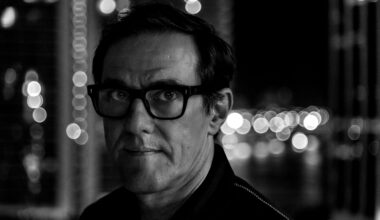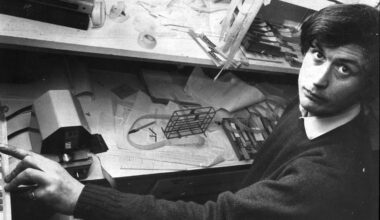To mark the release of a special deluxe vinyl edition of ‘Soul Mining’, Matt Johnson reveals the inside story of the classic The The album – the drug highs, the wrecked hotel rooms, the fist fights, the dumped tracks, the works…
“I just thought, ‘This game is rigged, I don’t want to play anymore’,” says Matt Johnson, making himself comfortable on a huge old sofa in his East London HQ. “I did a show for David Bowie’s Meltdown Festival in 2002, then I put all my gear in storage, locked it up and walked away. I didn’t give it a second thought. I was just fed up with it all.”
Since he “retired”, The The’s enigmatic kingpin has kept himself pretty busy. He’s composed film soundtracks, launched his own Cineola record label and the offshoot Radio Cineola, an ongoing series of bite-sized music and chat podcasts, set up the 51st State Press book imprint, started work on a biography… In that time, he’s given precisely one interview, a freewheeling Q&A about politics for a Dutch magazine called 200% in 2007. So it’s been a while since he’s had a proper chat.
“You are perpetually in debt, still on the terrible record deals you signed when you were a teenager,” he continues. “My situation is not unusual, this is the standard. And when you are eventually out of contract, you don’t have the clout to get your catalogue back and that’s what was upsetting me. Walking away from that wasn’t hard.”
So what brings him back to the music industry now? His classic 1983 long-player ‘Soul Mining’. In particular, the newly minted 30th anniversary deluxe vinyl ‘Soul Mining’ boxset. And yes, 1983 plus 30 equals 2013, but a year late is small beer when the result is lovingly remastered, beautifully repackaged and features an extra slab of rarities.
You can take the man out the music industry…
Matt Johnson’s parents ran pubs. They took on their first, The Two Puddings in Stratford, in the 1960s. The Puddings was East London’s premier music venue and his Uncle Kenny one of the area’s top music promoters. The sounds filling Matt’s young ears through the floorboards of the flat above the boozer belonged to the likes of Howlin’ Wolf, Jerry Lee Lewis, Gene Vincent and The Kinks.
Matt and his older brother Andrew would sneak a go on the musical instruments left set up by the bands when the pub was closed and they relished the visit of the man who replaced the records in the jukebox, handing piles of worn-out singles to the boys.
It’s little surprise he formed his first band aged 11, his mate Nick on cardboard box drums while he twanged elastic bands wrapped round a tissue box. But although he showed a keen interest in music, Matt hated school. By his own admission, he was a pretty decent truant. His prospects weren’t helped when he failed all his exams.
“My parents wanted me to be a caterer,” he sighs. “I was, like, a caterer? Fuck. That.”
He borrowed some money from his brother to buy a book – ‘So You Want To Be In The Music Business’ by Tony Hatch, who penned countless hits for Petula Clark, as well as the TV themes for ‘Crossroads’ and ‘Neighbours’. The tome had pages of addresses in the back – recording studios, record companies, publishing houses – and Matt wrote to them all. Mostly, the replies were along the lines of “we’ll put your name on file”, but a recording studio called De Wolfe, based on Wardour Street in London’s glittering West End, gave him an apprenticeship. He started in the summer of 1977, a month before his 16th birthday, learning everything from winding up cables properly to working magic armed with little more than a reel-to-reel, a Chinagraph pencil and a razorblade.
“I got £18 a week,” he recalls. “It was £10 a week on travel, a fiver to my mum, three quid for me. Not a lot of money even in those days, but the studio allowed me to do my own stuff out of hours.”
The first fruit of the De Wolfe studio downtime was a demo tape he called ‘See Without Being Seen’. The tracks included ‘Spaceship In My Garden’ and ‘Insect Children’, titles purloined from old American sci-fi comics.
“I also had my own studio in the pub cellar with a little tape recorder and a few effects pedals,” he says. “I’d work at De Wolfe, bring the tapes home to do the overdubs, then back to De Wolfe and so on.”
Another advantage of working at De Wolfe was that it was bang next door to the Marquee Club. Punk was at its peak, but Matt says he found the UK scene “a bit boring”. By contrast, he liked a lot of the US artists – Television, Patti Smith, Talking Heads, Pere Ubu – many of whom passed across the Marquee stage with Matt a permanent fixture in the audience, soaking it all up and turning his thoughts to putting together a live outfit of his own.
Recruiting band members was traditionally done via the small ads in the back of Melody Maker, but Matt’s MM advert for The The, which cited Throbbing Gristle, The Residents and Syd Barrett as influences, only attracted jazz musos and assorted freaks. A similar ad in the less frequented NME back pages proved more fruitful, unearthing keyboarder Keith Laws, Professor of Cognitive Neuropsychology at the University of Hertfordshire these days. It’s a common thread in those early, constantly shifting The The line-ups – bass player Tom Johnston, a cartoonist for the London Evening Standard, drummer Peter Ashworth, a hugely successful music and fashion photographer…
“I don’t consider myself a great musician,” explains Matt. “I’m a songwriter who uses an instrument to write songs, but those guys weren’t songwriters or musicians. They were great guys who liked music, who liked the idea of being in a band.”
Another set of demos proved the catalyst for change. Although The The was supposed to be a band, Matt realised he was not only writing all the songs, he was playing everything too. A new plan was afoot and he needed a record deal.
“I was in the offices of independent labels all the time,” he says. “Cherry Red, Rough Trade, 4AD. The ones who kicked me back horribly were the majors, but the indies were really nice. They’d sit and listen to the tapes, encourage me to keep at it.”
Ivo Watts-Russell was the first to blink and The The’s debut single, ‘Controversial Subject’, appeared on Ivo’s 4AD label in August 1980. It was produced by Wire’s Bruce Gilbert and Graham Lewis, but a further session with Gilbert and Lewis fell flat, so Ivo suggested Matt should produce himself and release an album under his own name rather than The The. The result was 1981’s ‘Burning Blue Soul’, an arty racket full of everything Matt had learnt at De Wolfe – tape loops, electronic experiments, heavily effected guitar riff-ola and distorted vocals.
Sit ‘Burning Blue Soul’ alongside ‘Soul Mining’ and there’s a devil at the crossroads at work, right? The two records are light years apart, but there’s a missing link, an unreleased album that bridges the gap between them. It was called ‘The Pornography Of Despair’ and one of the songs on it really stood out. Well, to most people anyway.
“I played the demo to one A&R guy and he just sat there, stone faced,” says Matt. “He turned it off halfway through, said ‘This isn’t very good is it?’, and threw me out of the office.”
It was a demo of ‘Cold Spell Ahead’, a track with a simple repetitive chord progression, a bright tsk-tsk-tsk drum machine and an unmistakable lyric: “I’ve got you under my skin where the rain can’t get in / But if the sweat pours out / Just shout / I’ll try to swim and haul you out”. In September 1981, with Matt Johnson’s ‘Burning Blue Soul’ album about to hit the shops via 4AD, Some Bizarre released ‘Cold Spell Ahead’ as the second The The single. And Some Bizarre boss Stevo was giving it the big ’un.
“I was getting frustrated,” says Matt. “I had two records out at the same time, but I was on the dole, living in a bedsit, and he just kept saying he could get me a major label deal.”
Having landed Soft Cell as Number One recording artists, Stevo certainly had plenty of new-found clout. He used it to talk London Records into funding studio time for Matt, a deal sealed with a handshake.
Matt was sent to New York to work with go-to producer Mike Thorne. The plan was to re-record ‘Cold Spell Ahead’, the resulting version becoming ‘Uncertain Smile’. A major label was taking Matt seriously. He was on his way. What could possibly go wrong?
“The session went really, really well,” he recalls. “And because Stevo had managed to get the whole thing paid for without signing any contracts, he took the track around to everyone else. Fuck the handshake.”
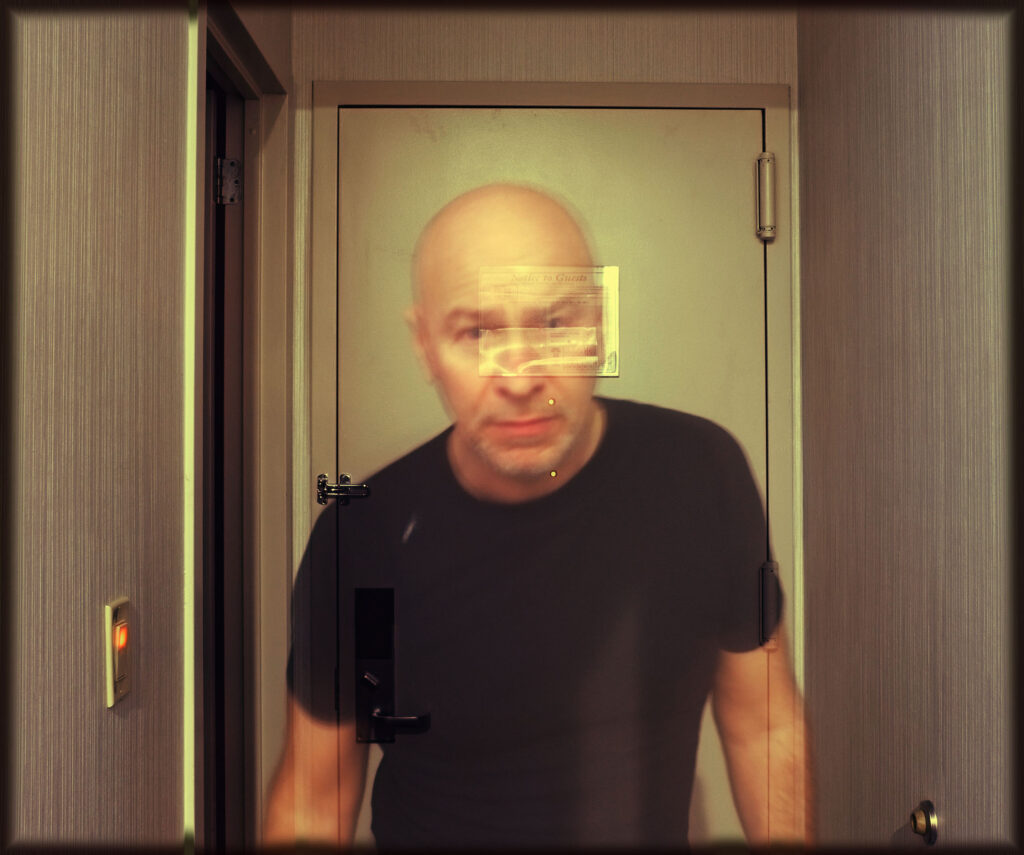
It was a brassy move that could have easily backfired. But the skulduggery paid off and CBS offered The The a deal, with larger-than-life CBS big chief Maurice Oberstein inking the contract sitting astride one of the lion statues in Trafalgar Square. At 3am.
“I wasn’t even there,” laughs Matt. “I don’t know why, I think Stevo wanted all the publicity for himself. Or I was too embarrassed…”
Matt Johnson’s work on ‘Soul Mining’ got off to a false start. Several false starts, actually. The first was in the autumn of 1982, when he returned to New York to meet with Mike Thorne again, this time to record a new track, ‘Perfect’. On a personal level, things were different for Matt now.
“From being on the dole with no money to suddenly…” he says, trailing off at the mention of The The’s reported £80,000 CBS advance.
Less than 24 hours after arriving in New York, Matt had “hooked up with a young lady” and disappeared into Alphabet City, the arse end of Manhattan’s Lower East Side. At the time, the area was a mix of immigrant families with a slow drip of musicians, b-boys and graffiti artists, arriving to take up the low rents associated with the insalubrious surroundings.
“It was very rough, very on edge,” he says. “But when you’re young, you are much more fearless, it makes you feel alive.”
Until you chug down a fat one rolled with pure Hawaiian grass.
“I was used to the weak stuff we smoked at De Wolfe. But this… I had a three-day bad trip. It was awful. I told Stevo I couldn’t go into the studio, so he said ‘Try some of this’ and gave me a couple of ecstasy tablets.”
The Some Bizarre crew – and Soft Cell in particular – were into ecstasy way before the Hacienda crowd turned gurning into a mass market pastime.
“There was a lady who used to come over, Cindy Ecstasy, a friend of Soft Cell’s,” says Matt. “It was a private little thing, only a couple of dozen of us knew about it. We were doing it long before everyone else.”
That said, if you’re off your gourd on grass, ecstasy probably isn’t the answer. Propped up by Quaaludes in a final attempt to straighten him out, it was clear the recording session was going nowhere.
“In this weird state of mind, me and Stevo smashed up our hotel rooms and decided to rent a car. We were like, ‘Where’s the roughest place we can go?’. So we went to Detroit. I was in such a frazzled state, full of testosterone and drugs… It was very, very intense.”
When he arrived back in London, he had little to show beyond a sizeable hotel bill.
“CBS said, ‘Right, what else do you have?’. I’d got ‘The Pornography Of Despair’, but it was quite raw… They asked if I could re-record the tracks in line with what I’d done with ‘Cold Spell Ahead’, but the reworkings lost the magic of the originals – the edginess, the experimentation. They were no longer experimental, but they weren’t commercial either.”
Matt had another attempt at producing himself but it just wasn’t working, although some of those tracks later resurfaced as B-sides – ‘Three Orange Kisses From Kazan’, ‘Mental Healing Process’, ‘Nature Of Virtue’, ‘Waiting For The Upturn’. So he decided to bring in a co-producer, settling on Paul Hardiman, an engineer who’d worked with Mike Thorne and was ready to make the step up. The next job was to find a studio.
“We looked at lots of places and came across John Foxx’s studio,” says Matt. “Paul and I both loved The Garden. Even though it was a basement, it had a fantastic atmosphere.”
They block-booked the Shoreditch studio and Matt set about writing a bunch of new songs, demoing them on a new-fangled four-track Fostex Portastudio. He already had ‘Uncertain Smile’ and ‘Perfect’, albeit not recorded to his liking, and also ‘The Sinking Feeling’, the only cut to survive the ‘The Pornography Of Despair’ cull.
“Some of them, like ‘The Sinking Feeling’, ‘This Is The Day’ and ‘Soul Mining’, were song based, but ‘Waiting For Tomorrow’ and ‘Giant’ were a different process,” he explains. “I would record 10 minutes of the same thing all the way through, all played by hand because there were no sequencers. The 24-track was layered with these different parts and the arrangement was created by using the mute buttons on the mixing desk.”
In the spring of 1983, Matt instigated a project that would further shape the direction of ‘Soul Mining’. Looking back, it was a gathering of the troops before the recording started in earnest. Every Thursday night for a month, ‘Rock And Roll With The The’ took to the stage at the Marquee, the sticky-floored venue Matt had virtually lived in during his time at De Wolfe.
Enlisting a dozen musician friends, The The became a supergroup for one month only. The cast was impressive – Soft Cell’s Marc Almond, Cabaret Voltaire’s Stephen Mallinder, Orange Juice’s Edwyn Collins and Zeke Manyika, early electronic pioneer Thomas Leer, Jim “Foetus” Thirlwell, Simon Fischer Turner… They were split into two bands, one mellow and one aggressive, with a further solo set from Matt and a grand finale featuring a dozen guitars chiming out an E chord, the musicians all dressed in black and wearing balaclavas. On the last night, some bright spark in the crowd took it upon themselves to attack the band during the finale.
“They started throwing bottles and glasses at the stage,” says Matt. “A big fight kicked off and the band disappeared pretty quickly, apart from three of us who were left fighting with the audience.”
The three? Jim Thirlwell is a shoo-in.
“It was Jim, yeah…”
Mallinder? Zeke? No, wait… Marc Almond! Handy with his fists, then?
“I’ll tell you what, Marc has got quite a temper and he will not stand for any nonsense,” marvels Matt. “He took his guitar off and swung it, hit someone, but we got the wrong people. He was so apologetic after.”
From the residency, Matt figured out who would best suit the songs he was currently working on. Leer and Thirlwell (credited as Frank Want) made significant contributions, as did session bass player Camille Hinds, but they were all eclipsed by one guest in particular. He was brought in to help out on a new version of ‘Uncertain Smile’, its third incarnation and a remarkable triumph.
“The early versions of ‘Uncertain Smile’ had a saxophone solo, but The Garden had a wonderful live room, with a beautiful Yamaha C3 baby grand, which I later bought and still own. We just thought the track needed something on the long outro. The piano seemed the obvious choice.”
But who to play it? How about Jools Holland, who’d left Squeeze a couple of years earlier and was now better known for presenting ‘The Tube’, the Channel 4 music show, than for his abilities on the ivories?
“It was an inspired suggestion,” says Matt. “It was a hot day and he turned up on his motorbike in full leathers, but he was as cool as a cucumber. He sat down and said, ‘Could I have a run-through please?’. Before the track was finished he said, ‘OK. Got it. Ready’.”
He had got it too. Jools’ contribution was laid down in one take apart from a drop-in “to fix a couple of dodgy notes” towards the end.
“We went to dinner with him afterwards,” says Matt. “It was only to a café round the corner, but I didn’t have any money so he ended up buying his own dinner.”
‘Soul Mining’ is a rite of passage album about that time in young lives where everything seems to be against you. Hello love and lust, meet loss and self-doubt and self-loathing. But it also offers hope, often dashed admittedly, but hope none the less.
“It is quite a personal set of songs,” confirms Matt. “Someone once said it was a record for small rooms but big imaginations.”
The album was released in October 1983 and was widely praised by the music press. The warm, rich quality of traditional instruments – piano, marimba, harmonica, accordion – sitting against a wash of new electronic sounds was quite unusual at that time.
“With most regular groups, the instrumentation is quite standard from song to song,” says Matt. “I didn’t have that restriction and I wanted to make use of that freedom.”
And make use of it he did. The album closer, ‘Giant’, is pure dancefloor, with a repetitive locked groove, a monster breakdown and an extended run out. It features Orange Juice sticksman Zeke Manyika in a drumming bonanza that wears its African influence at a spectacularly jaunty angle.
“All the drums are live,” says Matt. “There is a synthetic element because we ran some of the sounds into a Simmons kit, but they’re live drums, with me, Zeke and Paul Hardiman multi-tracking ourselves to build up the massive wall of chanting.”
It’s a gobsmacking finish to the record. Which bring us to ‘Perfect’. Despite his best efforts, Matt felt that none of the recorded versions of the track worked sufficiently well for it to make the final cut – on the UK version of the album at least.
“I didn’t find out until I went to America,” he says of the “idiot A&R man” who tacked ‘Perfect’ on the end of the US version. “I was in the CBS offices and I remember picking up a finished copy of the album and… ‘What? There are eight tracks on this. What the fuck is this…?’ ‘Well, so-and-so thinks it would help…’ ‘Well, it’s not so-and-so’s fucking album, it’s my album.’ It took me until 2002 to get ‘Perfect’ taken off, by which point the American fans are going, ‘What the fuck? “Perfect” is missing. This is not the proper album’.”
Whichever version of ‘Soul Mining’ we’re talking about, the highlight for many people is ‘This Is The Day’. It’s quite probably The The’s most enduring song.
“Ultimately, I am an optimistic person,” says Matt. “I have faith in the human spirit, even if I do tend to write about the darker elements of human nature. ‘This Is The Day’ is a positive song, though.”
Over the years, it has taken on a life of its own. It’s got people through exams, weddings, births, funerals, life in general…
“That is the most wonderful payback you can have,” he says. “You put a lot of work into creating these little songs, and the fact that they go out there, into other people’s lives and get them through difficult and important times, it’s a fantastic feeling. For me, that’s the real reward of being a songwriter.”
‘Soul Mining (30th Anniversary Deluxe Edition)’ is out on Sony
Meet The Family
Gerard Johnson
Matt’s kid brother Gerard has a growing reputation as an up and coming film director. His debut feature, ‘Tony’, a brutal black-humoured thriller, was released in 2009 to critical acclaim. The soundtrack is by The The and was released on Matt’s Cineola imprint. Gerard’s latest flick, a crime drama called ‘Hyena’, premiered as the opening movie at this year’s Edinburgh International Film Festival, with the festival director saying it “clearly establishes Gerard Johnson as a major talent in British film-making”. The soundtrack, yup, again by The The, will be released on Cineola later this year.
Andrew Johnson
You may know Matt’s big brother as Andy Dog, the illustrator who created many of the distinctive The The record sleeves. The cover of ‘Soul Mining’, while striking, perhaps shouldn’t have been. “It’s a picture of one of Fela Kuti’s wives,” explains Matt. “I just really liked the look of it. I remember at the time my brother said, ‘Are you sure?’. It didn’t really fit with the previous covers he’d done, but I was quite insistent. I’m not sure I made the right choice, though. He did do an alternative version, a profile of my head with me screaming. Looking at the two pictures now, that really should have been the cover.”
Eddie Johnson
Matt’s dad Eddie has written a memoir about his time as the licensee of one of East London’s best known boozers. The book, ‘Tales From The Two Puddings’, is a fascinating, richly drawn insight into 1960s London. It was published by 51st State Press, which is Matt’s book company. The name comes from The The’s ‘Heartland’, where “This is the 51st state of USA”.
